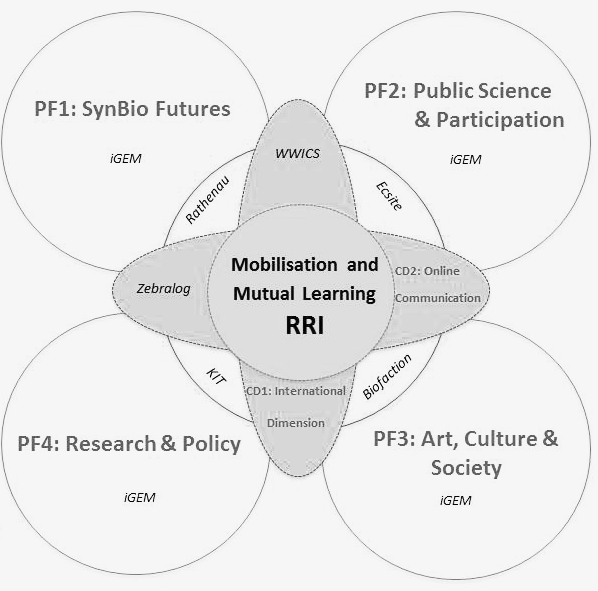Project Organisation
The activities in the SYNENERGENE project are structured by four thematic platforms, two cross-cutting core dimensions, several open fora and two additional work packages dealing with evaluation and management of the overall project.
Overview of SYNENERGENE's organisational structure
Platform 1: SynBio Futures
Lead Partner: Rathenau Institute
The work in platform 1 will involve mobilisation and mutual learning activities oriented to future challenges that relate to the societal embedding and impacts of potential applications of synthetic biology. Future perspectives will be articulated in scenarios – including ‘application scenarios’, ‘innovation scenarios’ and ‘techno-moral scenarios’ –, which will be used to support stakeholder activities and public engagement activities in platform 1 as well as other platforms.
Platform 2: Public Involvement
Lead Partner: The European Network for Science Centres & Museums
In the context of platform 2, third parties share expertise, learn from each other and develop a common understanding of crucial aspects of synthetic biology (phase 1). They collaborate, along with local experts, in the development of different types of actions for publics and they join together again to share their ideas and talk about what they came up with, under the supervision of the expertise of all SYNENERGENE partners (phase 2). Finally, they run the activities at local and national level, they report on them and share results, and whenever possible they collect feedback from the participants (phase 3). All outcomes are fed back into the different SYNENERGENE platforms and the third parties project groups and are used for the collaborative shaping of guidelines for the development of RRI governance policies and the drafting and implementation of the SYNENERGENE Participation Agenda.
Platform 3: Art and Culture
Lead Partner: Biofaction KG
Work in platform 3 focuses on actions at the point where art and science overlap and on academic contributions that help us better understand the cultural significance of synthetic biology. These include, among others, the Bio:Fiction Science, Art & Film Festival, art exhibitions on synthetic biology, cooperations between artists and scientists in workshops and residency programmes as well as theatre performances.
Platform 4: Research and Policy
Lead Partner: Karlsruhe Institute of Technology
In the context of platform 4, mobilisation and mutual learning processes will be subsequently set up, around two basic questions, namely (1) What are the prerequisites for shaping research and innovation according to societal needs (especially in the nascent state of a discipline like synthetic biology), and for defining such societal needs? And (2) Which means could and should be used to influence research and innovation from inside and outside science, and how could social aims be embedded in research? The work will involve efforts to generate a knowledge base for learning and mobilisation, including state-of-the art online tools, as well as mutual learning from a wide variety of stakeholders relevant for research and policy issues.
Core Dimension 1: International Dimension
Lead Partner: Woodrow Wilson International Center for Scholars
Under the leading auspices of core dimension 1, activities related to the International Dimension will not only act as an element of horizontal integration – interconnecting different arguments, debates, experiences and practices developed through platform 1, platform 2, platform 3 and platform 4 – but will also ensure the involvement of international participants from North America, Latin America and Asia.
Core Dimension 2: (Online-) Communication and Dissemination
Lead Partner: Zebralog GmbH & Co. KG
The work in this core dimension aims to organise, integrate and improve mutual learning and communication activities within the MMLAP by powerful and cutting-edge online means. At the same time, it will generate and connect both online and face-to-face outreach and feedback channels to stakeholders and the public. By integrating internal and external communication on the one hand and online and face-to-face exchange with actors and the public on the other hand, it will generate important synergies for mutual learning within and beyond the MMLAP, and foster the meaningful and effective dissemination of SYNENERGENE results. Specifically, this core dimension subsumes and supports activities by partners in the MMLAP which encompass (a) internal communication between partners, (b) the creation of a knowledge base to document and support the learning process, (c) communication with the public and public relations of the MMLAP, (d) online dialogue with the public on synthetic biology, and include dissemination, raising awareness and implementation of the results of the MMLAP, including the SYNENERGENE Agendas, in order to foster discourse on, and improve practices of RRI in synthetic biology.
Open Fora
SYNENERGENE's Open Fora are a means of targeting specific stakeholder groups and players in research and innovation policies. These specialised stakeholder fora will provide stakeholder groups with specific information concerning the results of SYNENERGENE and will contribute significantly to the three SYNENERGENE agendas. The open fora include the following fora:
Business Forum
The Business Forum connects private sector stakeholders to stimulate the debate on synthetic biology. The forum is coordinated by Geneart AG.
Science Forum
The Science Forum connects scientists of different disciplines to stimulate the debate on synthetic biology. The forum is coordinated by ETH Zürich.
Civil Society Forum
The Civil Society Forum connects non-governmental initiatives and organisations to stimulate the debate on synthetic biology. The forum is coordinated by What Next Forum.
Policy Forum
The Policy Forum connects policy makers to stimulate the debate on synthetic biology. The forum is chaired by Wolf-Michael Catenhusen.
Media Forum
The Media Forum aims to bring together science journalists, scientists and other players to discuss the role and the perspective of science journalism and public media in the discourse and governance of science and technology. The forum is coordinated by EUSJA.
Work Package: Evaluation
Lead Partner: Gene Rowe Evaluations
The work package encompasses the impartial evaluation of mobilisation and mutual learning actions and their methodology from the thematic platforms and the international dimension.
Work Package: Management
Lead Partner: Karlsruhe Institute of Technology
This work package covers all activities related to the management of the consortium.

